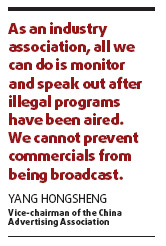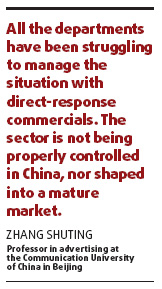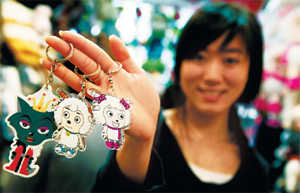Biz Unusual
Cutting off criminal channels
By Hu Yongqi (China Daily)
Updated: 2009-12-01 08:00
|
|
Almost 200 million people in China watch television every day and, according to a 2006 study by CTR Market Research in Beijing, 94 percent of all infomercials are targeted at housewives watching in the afternoon and people who watch late into the night.
Less than 50 percent of the consumers polled were happy with their purchases from direct-response television, the survey said.

"Advertisers have been attracted to direct-response commercials by the vast number of viewers and potential profits," said Zhang Shuting. "Also, television stations are happy because they usually struggle to find advertisers for off-peak times, such as after midnight and before 6 am. These infomercials give them extra income."
In its last study, also in 2006, the China Consumers' Association discovered infomercials made up 61 percent of all "illegal" advertising - when the products promoted are of poor quality - on 30 major television channels across China.
Media experts said supervision of advertising standards is inefficient as it falls under too many government departments, including the State Administration of Industry and Commerce, and State Administration of Radio, Television and Film.
"All the departments have been struggling to manage the situation with direct-response commercials," said Zhang. "Because of this, the sector is not being properly controlled in China, nor shaped into a mature market."
A joint notice from several administrations banned the use of television and radio infomercials to promote medicine or medical devices, as well as products that promised weight loss, height gain or larger breasts, from Aug 1 last year. But many Chinese channels continued to carry direct-response advertisements for such products after the deadline, resulting in the authorities issuing warnings to 12 stations.

Officials for the administration estimated the ban impacted almost half of all direct television shopping programs, but insisted it was in the best interests of the industry in the long term.
A mature market where quality can be ensured will help promoters to make more profits, officials said.
Infomercials are currently classed as television "shows", which means they are not required to meet the nation's advertising standards. However, that will be rectified from Jan 1 next year, according to a second notice by the administration on Sept 21.
Experts said the move would mean infomercials are vetted before being syndicated across China or sold to satellite stations, like those based in Beijing, Tianjin and Chongqing.
Direct-response advertisements were also banned from news channels and international channels, such as CCTV 9, and cannot be shown on satellite channels between 6 pm and midnight. Products deemed unsuitable for minors, such as breast-enlargement supplements, can also no longer be broadcast on channels aimed at children.
Gong Zhiwei, a Beijing-based advertising agent in his 30s, works with dozens of provincial television stations. He said his clients often run commercials, phone lines and distribution offices in three different cities, making them hard to trace.
|
|||
To combat this, the authorities have tightened the rules governing advertisers. Before airing a commercial, stations are now required to check promotion firms have fixed head offices where they can be traced, as well as registered capital of at least 10 million yuan.
Television companies are encouraged to shun advertisers that have been found guilty of fraud by the monitoring authorities in the past three years.
"All our clients must show us their licenses first," said Zhang Hao, a manager with CCTV Home Shopping. "Before any infomercial is broadcast on our channel, our staff also checks the content and script. No false information or exaggerated lines are tolerated."














